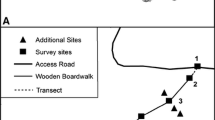Abstract
The pulmonate land snail, Rumina decollata, is a highly invasive gastropod adapted to arid conditions, and native from the Mediterranean area. It was recorded for the first time in Argentina in 1988, in the northeastern Pampas of the Buenos Aires Province, a region characterized by a humid mesothermal climate with no water deficit. In the present contribution, we report the finding of populations of this species in the semiarid region of La Pampa and Mendoza provinces in central-western Argentina. The present findings extend the invasive distributional range of R. decollata westwards through more than 1000 km from the site where it was detected in 1988. Although no damages to agricultural areas have been reported to the moment in Argentina, the presence of R. decollata in semiarid areas warns us about its potential as an important plague in the future.


Similar content being viewed by others
References
Carr R (2002) Geographical variation of taxa in the genus Rumina (Gastropoda: Subulinidae) from the Mediterranean region. J Conchol 37(5):569–577
Chang KM, Chung PS (1993) Rumina decollata (Linné, 1758) from China (Pulmonata; Subulinidae). Bull Malacol, Republic of China 17:87–89
Cowie RH (2001) Can snails ever be effective and safe biocontrol agents? Int J Pest Manage 47(1):23–40
Fisher TW, Orth RE, Swanson SC (1980) Snail against snail. Calif Agric 34:18–20
Mashino K (1992) Rumina decollata (Linnaeus) occurred in Ube City, Yamaguchi Prefecture. Chiribotan 23(2):55–56
Mashino K (2001) Dispersion of Rumina decollata in Ube, Yamaguchi Prefecture.Chiribotan 32(1):32–34
Minato H, Uozumi K (1992) Rumina decollata (Linnaeus, 1758), a new intruder in Japan. Chiribotan 22(3):72–74
Miquel SE (1988) Reciente introducción de un gasterópodo terrestre en la República Argentina. Neotrópica 33(90):88
Miquel SE, Parent H, Scarabino F (1995) Achatinoidea introducidos en la Argentina y el Uruguay (Mollusca: Gastropoda: Stylommatophorida). Neotrópica 41(105–106):26
Moreno-Rueda G (2002) Selección de hábitat por Iberus gualtierianus, Rumina decollata y Sphincterochila candidisima (Gastropoda: Pulmonata) en una sierra del sureste español. Iberus 20(1):55–62
Myers JH, Simberloff D, Kuris AM, Carey JR (2000) Eradication revisited: dealing with exotic species. Trends Ecol Evol 15(8):316–320
Prohaska F (1976) The climate of Argentina, Paraguay and Uruguay. In: Schwerdtfeger E (ed) Climates of Central and South America. Elsevier, Amsterdam, pp. 13–112
Selander RK, Kaufman DW (1973) Self-fertilization and genetic population structure in a colonizing land snail. Proc Natl Acad Sci 70(4):1186–1190
Acknowledgments
Financial support for this study was provided by Consejo Nacional de Investigaciones Científicas y Tecnológicas (CONICET), Res. 1273/04. We acknowledge Marcelo Farenga for drafting the location map. CGDF is a member of the Scientific Research Career of CONICET.
Author information
Authors and Affiliations
Corresponding author
Rights and permissions
About this article
Cite this article
De Francesco, C.G., Lagiglia, H. A predatory land snail invades central-western Argentina. Biol Invasions 9, 795–798 (2007). https://doi.org/10.1007/s10530-006-9076-7
Received:
Accepted:
Published:
Issue Date:
DOI: https://doi.org/10.1007/s10530-006-9076-7




